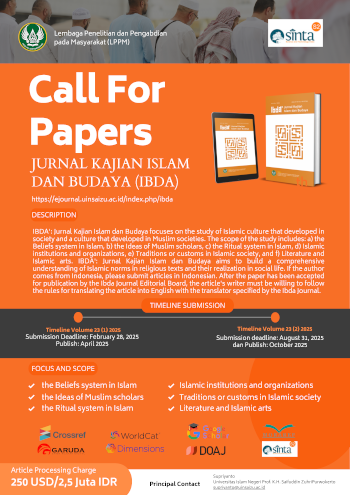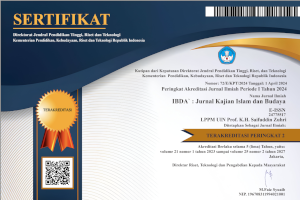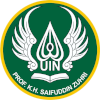Ideologi dan Wacana Kognisi Keagamaan di Pondok Pesantren Tradisional dalam Gema Santri
DOI:
https://doi.org/10.24090/ibda.v16i2.1680Kata Kunci:
Traditional, Discourse, Cognition, IdeologyAbstrak
This article discusses the findings of the ideology and religious attitudes through the perceptions of students on the work of the literary expression as a form of discourse and cognition in the traditional boarding schools. Research literature this is a stage of advanced exploration and study results of mentoring, the development potential of the students in the form of an anthology of short stories, “Gema Santriâ€. Research methods in the form of a descriptive study ekploratory literature. The purpose of the research was elaborated the discourse ideology and cognition of the traditional boarding schools students in Semarang city, based on research, as one of the areas adjacent to the city’s guardian (kota Wali). The research benefits gives an overview on the public discourse about ideology and cognition discourse based boarding schools traditionally. And that is proven dynamic and able to co-exist with modernization. The context is the social and ideological as the concept of the nature human beings as social beings. The findings is the content of education and behavior in boarding schools far away from the traditional perception of ideology and cognition discourse, fanatics, and thus is dynamic in generating a generation of nationalists, dynamic, and multicultural.Unduhan
Data unduhan belum tersedia.
Referensi
Al-Ma’ruf, A. I. (2011, Juni). Peran Sastra Multikultural sebagai Media Komunikasi Antarbangsa. Literasi, 1(1), 31-42.
Benard, S. (2016, May). Cohesion from Conflict: Does Intergroup Conflict Motivate Intragroup Norm Enforcement and Support for Centralized Leadership? (A. S. 2012, Ed.) Social Psychology Quarterly, XX(X), 1-24. doi:10.1177/0190272512442397
Fatnar, V. N., & Anam, C. (2014, Desember ). Kemampuan Interaksi Sosial antara Remaja yang Tinggal di Pondok Pesantren dengan yang Tinggal Bersama Keluarga. EMPATHY, Jurnal Fakultas Psikologi, 2(2), 71-75.
Hidayat, D. A. (2012, Agustus). Perbedaan Penyesuaian Diri Santri di Pondok Pesantren Tradisional dan Modern. TALENTA PSIKOLOGI, 1(2), 106-126.
Jamaluddin. (2015). Model Pendidikan Berbasis Masyarakat. Al-Fikrah: Jurnal Kependidikan Islam, 1-10.
Jati, W. R. (2015, Juli - Desember ). Kesalehan Sosial sebagai Ritual Kelas Menengah Muslim. IBDA Jurnal Kebudayaan Islam, 13(2), 336-348.
Minarti, P. D. (2012). Apakah Aku Bisa Sembuh? In H. Ed., & M. Ed., Gema Santri (pp. 1-176). Kontak Media.
Suparjo. (2017). Relasi Kiai-Santri di Pesantren Futuhiyyah Demak. Ibda Jurnal Kebudayaan Islam, 15(2), 119-214. doi:10.24090/ibda.v15i2.2017.pp192-214
van Dijk, T. A. (1998). Ideology; A Multidisciplinary Approach. London: SAGE Publications.
Benard, S. (2016, May). Cohesion from Conflict: Does Intergroup Conflict Motivate Intragroup Norm Enforcement and Support for Centralized Leadership? (A. S. 2012, Ed.) Social Psychology Quarterly, XX(X), 1-24. doi:10.1177/0190272512442397
Fatnar, V. N., & Anam, C. (2014, Desember ). Kemampuan Interaksi Sosial antara Remaja yang Tinggal di Pondok Pesantren dengan yang Tinggal Bersama Keluarga. EMPATHY, Jurnal Fakultas Psikologi, 2(2), 71-75.
Hidayat, D. A. (2012, Agustus). Perbedaan Penyesuaian Diri Santri di Pondok Pesantren Tradisional dan Modern. TALENTA PSIKOLOGI, 1(2), 106-126.
Jamaluddin. (2015). Model Pendidikan Berbasis Masyarakat. Al-Fikrah: Jurnal Kependidikan Islam, 1-10.
Jati, W. R. (2015, Juli - Desember ). Kesalehan Sosial sebagai Ritual Kelas Menengah Muslim. IBDA Jurnal Kebudayaan Islam, 13(2), 336-348.
Minarti, P. D. (2012). Apakah Aku Bisa Sembuh? In H. Ed., & M. Ed., Gema Santri (pp. 1-176). Kontak Media.
Suparjo. (2017). Relasi Kiai-Santri di Pesantren Futuhiyyah Demak. Ibda Jurnal Kebudayaan Islam, 15(2), 119-214. doi:10.24090/ibda.v15i2.2017.pp192-214
van Dijk, T. A. (1998). Ideology; A Multidisciplinary Approach. London: SAGE Publications.
Unduhan
Diterbitkan
2018-11-08
Cara Mengutip
Umaya, N. M. (2018). Ideologi dan Wacana Kognisi Keagamaan di Pondok Pesantren Tradisional dalam Gema Santri. IBDA` : Jurnal Kajian Islam Dan Budaya, 16(2), 276–286. https://doi.org/10.24090/ibda.v16i2.1680
Terbitan
Bagian
Articles
Lisensi
Authors who publish with this journal agree to the following terms:
- Authors retain copyright and grant the journal right of first publication with the work simultaneously licensed under a Creative Commons Attribution-ShareAlike License a that allows others to share the work with an acknowledgement of the work's authorship and initial publication in this journal.
- Authors are able to enter into separate, additional contractual arrangements for the non-exclusive distribution of the journal's published version of the work (e.g., post it to an institutional repository or publish it in a book), with an acknowledgment of its initial publication in this journal.
- Authors are permitted and encouraged to post their work online (e.g., in institutional repositories or on their website) before and during the submission process, as it can lead to productive exchanges, as well as earlier and greater citation of published work (See The Effect of Open Access).
















